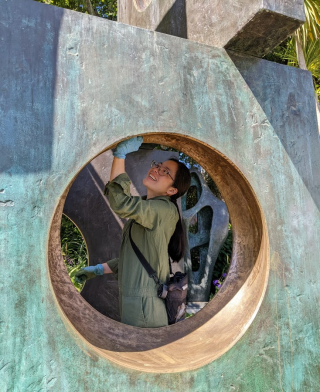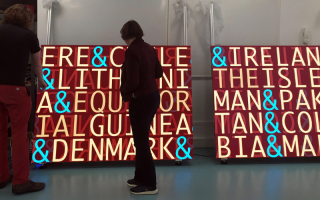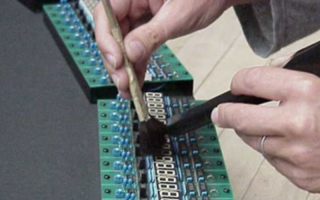This programme will produce contemporary art conservators who will be ready to address the challenges of caring for the art of our time within a rapidly changing world. The degree focuses on the conservation of contemporary sculpture, installation, time-based media works of art and design, including conceptual, performance, digital and mixed media works.
The content of the programme will reflect current debates that are impacting the way in which we conserve, steward and care for contemporary art, design and media, thinking about the values and histories that underpin conservation practice, and the urgent challenges facing the sector more broadly. This thinking underpins a programme that is fundamentally grounded in hands-on training for real-world situations.
| Study Mode | Full-time or part-time available |
| Tuition Fees | UK: £14,100 / Overseas £29,000 per annum (full-time) |
| Duration | 2 years full-time / 4 years part-time |
| Programme Starts | September 2023 |
| Campus | This programme is primarily located at UCL East |
Is this innovative MSc for you?
- Are you an advocate for the art and culture of our time, able to engage with the major challenges of the day?
- Do you want to work closely with art and artists, responding to the changing nature of emerging artistic practice?
- Can you bring an interdisciplinary focus that combines both scientific and humanities-based thinking through working with contemporary art and heritage?
- Would you like to develop your skills to handle, treat and manage artworks?
- Are you able to work collaboratively to understand and address complex real-world problems?
Answered "yes"? You could be the perfect student for us!

Study with us
This exciting two-year MSc offers a unique opportunity to undertake vocational training in the conservation of contemporary sculpture, installation, time-based media works of art and design including conceptual, digital, socially engaged, performance-based and mixed media works. Whilst ensuring that students are engaged with the key debates around the conservation and stewardship of contemporary art and design, the programme is fundamentally grounded in hands-on training for real-world situations.
- More about the programme
This progressive and forward-facing programme will train the next generation of contemporary art conservators to develop and implement conservation strategies for a wide range of contemporary artistic practice.
The programme offers interdisciplinary teaching and research, drawing on cutting-edge thinking from the humanities and the sciences. Conservation is a fascinating profession that is inherently interdisciplinary, valuing and drawing on the knowledge that both humanities and sciences brings to the range of questions raised by the conservation of contemporary art and culture. Increasingly conservators are required to not only have expert material knowledge and hand skills but also the capacity to draw on thinking from a range of fields to resolve complex conceptual questions related to issues such as the authenticity of objects, obsolescence, ideas of the future and also an expanded understanding of the ethics and politics of conservation. Conservators working in this field also have excellent skills in collaborative working, engaging closely with artists and their networks, curators and communities to build connections to better understand and support the care of artworks.
Conservators think across three temporalities: understanding the history of an artwork and how it was made; working with others to bring it to current audiences; and imagining and planning for the future of a work. The programme will be taught through practical experience, in partnership with a wide range of institutions.
The programme will enable its students to engage in the urgent challenges faced by the conservation of contemporary art and culture, from understanding how the climate emergency is changing the way we think about the conservation of collections to thinking about how issues of racial and social equity are reflected in conservation practice and engaging with conservation as an agent of change within society.
The programme will engage both locally and internationally to connect with the contemporary art and design community and to listen to the range of voices influencing and shaping conservation and art practice today. Through the connections held by the MSc and our research, the programme is in dialogue with others internationally engaged in the care and stewardship of contemporary art and design.
How is the programme structured?
This is a vocational programme designed for you to develop your skills to become a conservator of contemporary art with an emphasis on sculpture, installation, conceptual, mixed media, digital, socially engaged practice, performance and time-based media works of art. Recognising that students will come from a range of different academic backgrounds, the programme will work hard to support students to follow their own personal trajectory in developing the skills and knowledge necessary to build on their existing knowledge, experience and interests to enter or develop within this fascinating profession. During the two-year programme you will build a critical understanding of the practice and theory of conservation working on a range of conservation challenges.
- Year 1
In the first two terms of the MSc you will develop skills in the visual and material examination of artworks. You will learn the principles of condition checking and about methods of non-invasive instrumental analysis such as Raman Spectroscopy, XRF and the use of UV light and methods for condition checking media artworks such as the use of QC Tools for video. By the end of the MSc you will be able to undertake independent research to develop conservation plans for a range of contemporary artworks and objects. Alongside this MSc, accepting that students will have different levels of chemistry, you will learn about the deterioration of contemporary materials through practical lab classes and a visit to a contemporary art collection to observe visible signs of deterioration.
Responding to the growing need for these skills within the workplace you will also learn about communicating conservation. This will involve a mix of lectures, seminars and practical work to acquaint you with key issues around museum learning, audiences and the wider relationship between conservation and society. The practical work will involve a collaborative project resulting in a creative output which might be realised in a variety of different ways that might include text, drawing, photography, film or audio distributed via social media, or as a campaign, or in the creation of a display at the UCL Marshgate building.
In the final term of the first year you will attend an advanced seminar in the conservation of contemporary art and media. This module is designed to expose you to a range of challenges that are current for objects in a museum conservation setting. The module is designed to be developed collaboratively with the conservation team at the V&A, building your skills and expertise.
In the third term students will also carry out projects working on either an artwork or design object through studio-based practice.
In the first year you will gain an understanding of the development of the field, and the key principles and debates underpinning current practice for conserving complex contemporary artworks. You will gain an understanding of ethical and political issues in the conservation of contemporary art, including consideration of issues of climate change and legacies of colonial practices within conservation and about working with artists, their representatives and broader communities. You will also learn about methods of documentation, risk assessment and preventive conservation practices.
During the first year there will be optional modules in art history and specific areas of conservation to allow you to go deeper into a particular topic. UCL East also offers a range of modules for all students for example to develop your business skills or to explore power, inclusion and exclusion with local communities. You will also be able to opt to study a language, or develop your academic English for international students.
- Year 2
Central to the second year is a work placement at one of the many institutions with which the programme has a partnership which will culminate in a dissertation or project report. This work placement will uniquely prepare students for workplace contexts while developing your practical skills.
In the second year you will have the opportunity to join art history MA students at the Bloomsbury campus to study key debates in art history as well as programme specific modules and UCL East electives.
Our Associate Partners
The programme has links to a range of organisations both in the UK and internationally supporting student placements.
The Material Studies Laboratory is a research and teaching facility housed within the Department of History of Art on the Bloomsbury campus. It consists of two laboratory spaces, one dedicated to teaching and handling of materials and artefacts, with the second focusing on the instrumental analysis of heritage materials. The facility is equipped with instruments for materials characterisation, with a particular focus on mechanical analysis of cultural heritage materials. The laboratory also has portable equipment that can be used for scientific investigations onsite within museum and heritage collections.
 Close
Close



